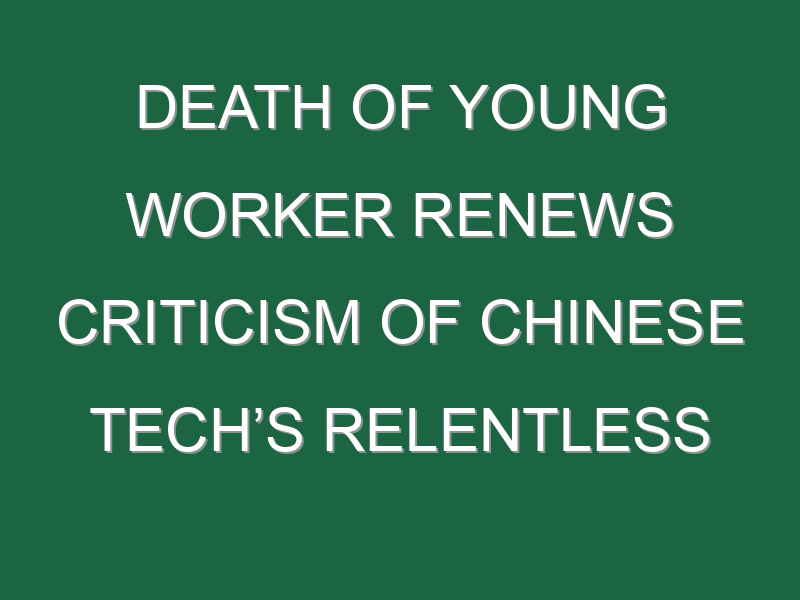Chinese authorities began a probe into working conditions at Pinduoduo Inc. following the death of an employee in her early 20s that renewed criticism of the long hours commonly practiced at China’s tech companies.
The e-commerce company confirmed that a female employee collapsed while walking home with colleagues at 1:30 a.m. last Tuesday. The employee, who was born in 1998 and joined Pinduoduo in July 2019, could not be resuscitated and died after nearly six hours of first aid, according to a statement. Her death sparked a social media backlash against Pinduoduo and the relentless working schedules expected of its workers, prompting district officials at the Shanghai Municipal Human Resources and Social Security Bureau to commence an investigation.
The so-called 996 office schedule — 9 a.m. to 9 p.m., six days a week, plus overtime — has spurred criticism in previous years following complaints from tech workers and earlier deaths. Still, tech billionaires from Alibaba Group Holding Ltd. founder Jack Ma to JD.com Inc. chief Richard Liu have endorsed the practice as necessary for survival in an intensely competitive industry and the key to accumulating personal wealth.
Subscribe to Eastworld for weekly insight on what’s dominating business in Asia, delivered free to your inbox.
“Chinese internet companies should think beyond reaching unicorn status and IPOs and a steady, healthy corporate culture is a must for long-term growth,” said Marlon Mai, Shanghai-based managing director with recruitment consultancy Morgan McKinley. “Employee health is an issue that can’t be ignored.”
The online criticism adds to the challenges for China’s largest tech companies, which spent the past year fending off efforts by the Trump administration to curb their growth while navigating heightened regulatory scrutiny at home. Beijing in November unveiled regulations designed to root out monopolistic practices in the internet industry, sparking a sell-off in the previously high-flying tech sector.
Despite the year-end slump in Alibaba and its peers, Pinduoduo had been relatively unscathed with its stock rising to a record on Dec. 30. Shares of the firm, which spans a $205 billion e-commerce empire and is aggressively seeking to further bolster growth by expanding into the red-hot sector of online groceries, ended the year up nearly 370%. That helped elevate founder Colin Huang to the position of China’s second-richest man, overtaking fellow internet entrepreneurs like Alibaba’s Ma and Tencent Holdings Ltd. Chairman Pony Ma, according to the Bloomberg Billionaires Index. Pinduoduo sank 6.1% in New York Monday.
A hashtag about the employee’s death has drawn more than 260 million views on the Twitter-like Sina Weibo service as of Tuesday. Criticism of the online retailer intensified after Pinduoduo confirmed that a post on the Quora-like Zhihu service — which said that all people from the bottom rungs of society exchange their lives for money — had originated from its official account. After initially claiming that the post was fake, Pinduoduo later apologized and said a contractor had uploaded it without authorization, adding that the company strongly opposed the views expressed.
The state-run CCTV on Tuesday published a commentary that warned against trading human life for profit. Without naming specific corporations, CCTV called for authorities to step up regulatory oversight to protect the rights of workers.
In response to the uproar, the Shanghai Municipal Human Resources and Social Security Bureau will dispatch an investigative team to Pinduoduo and collect relevant information from the company, a Changning District branch official who only wanted to be known as Wang told Bloomberg News by phone.
More must-read tech coverage from Fortune:
- A brief history of Bitcoin bubbles
- Commentary: Why the U.S. needs a national climate investment fund
- The biggest conspiracy theories of 2020 (and why they won’t die)
- Why Julian Assange’s victory does little to help the cause of press freedom
- Commentary: Marketers can’t predict what you’ll buy—even if they use A.I.




